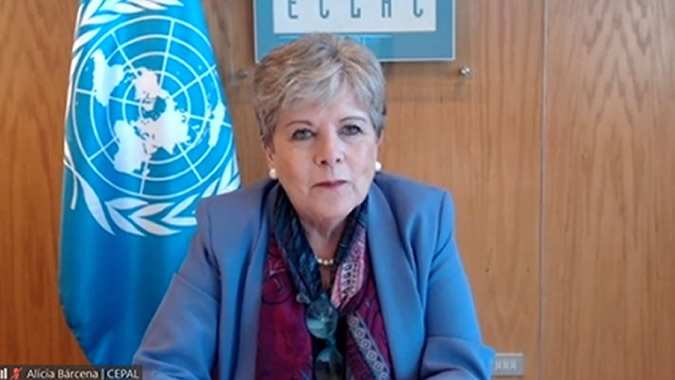Alicia Bárcena Urges for Restoring Policy as an Instrument of Change and Forging Compacts that Would Lay the Foundation for Building a Welfare State
ECLAC’s Executive Secretary participated as a featured panelist in the seminar “Social and Economic Challenges in Latin America and the Caribbean in the Post-Pandemic Period,” organized by Flacso Chile.

The Executive Secretary of the Economic Commission for Latin America and the Caribbean (ECLAC), Alicia Bárcena, urged today for restoring policy as an instrument of change and for forging social compacts that would lay the foundation for building a welfare State, during a seminar entitled “Social and Economic Challenges in Latin America and the Caribbean in the Post-Pandemic Period,” organized by the Latin American Faculty of Social Sciences (Flacso) Chile.
ECLAC’s highest authority was one of the main speakers at the event, which featured the participation of Miguel Cera-Hatton, Minister of Economy, Planning and Development of the Dominican Republic and a Flacso professor; Manuel Rojas Bolaños, a Sociologist, former diplomat and professor at Flacso Costa Rica; and Eduardo Menz Queirolo, an Economist, Public Administrator and Teaching Coordinator at Flacso Chile.
“We are facing a change of era, more than an era of changes. There is a crisis of multilateralism with geopolitical tensions that hopefully will get resolved, but they are overt. The world is reorganizing itself into a new economic geography. In addition, we have global challenges such as climate change, the technological revolution and the migratory issue, which is an unresolved matter,” Alicia Bárcena summed up in her remarks.
She recalled that before the pandemic, Latin America and the Caribbean already had significant structural gaps, insufficient growth, weakened trade, external restrictions, low productivity and, most certainly, the inequality that defines the region.
“The lack of responses to the demands of the middle strata, magnified by the pandemic, is the basis of social disenchantment. This anger represents a breaking point with a model associated with decades of wealth concentration, environmental deterioration and insufficient growth. The backdrop is that the culture of privilege and inequality prevails in our region,” Bárcena sustained.
In her presentation, she indicated that 80% of Latin Americans think their government has been involved in episodes of corruption, and she underlined that tax evasion and avoidance in the region amounts to 6.3% of regional GDP, and just 22% of citizens trusted the government in their countries in 2018 versus the 45% credibility rate seen in 2010.
Furthermore, the Executive Secretary recalled that we are facing the worst crisis in a century. According to ECLAC’s latest estimates, the region’s GDP is seen falling by -9.1% on average; poverty is expected to affect 231 million people and extreme poverty, 96 million; and unemployment is seen rising by 47 million people, with labor informality reaching 54%. Also, exports are seen falling by 14% and some 2.7 million businesses are expected to close, microenterprises chief among them. In addition, around 40 million households have no Internet connection.
“ECLAC has projected three scenarios demonstrating that the recovery in the region’s economic activity levels will take several years. With growth of 3.0%, 2019 levels would be attained in 2023,” the senior United Nations official warned.
Alicia Bárcena affirmed that countries have responded to the pandemic’s effects and have financed their fiscal efforts in different ways. In fact, 17 countries have received financing from the International Monetary Fund (IMF) and 4 have Flexible Credit Lines from the Fund totaling $107.13 billion dollars. However, these efforts are not enough to meet the needs of middle-income countries.
ECLAC’s Executive Secretary asserted that in Latin America and the Caribbean, we must build a new future to grow with equality and sustainability.
“To that end, we at ECLAC have worked on a model that concentrates on the interaction between economic, social and environmental dimensions and makes it necessary to think about these three crises, as well as their solutions, in a joint way,” she stated.
Separately, the Commission’s most senior representative indicated that achieving equality would require a minimum growth rate of 4% with redistribution.
“In order to eliminate poverty in our region by 2030, two conditions must be met: transference of one poverty line from the richest decile to the poorest, starting with 1.5% of GDP in 2021 and rising 0.5 points annually to reach 3% in 2024, and the attainment of a 4% growth rate to create the jobs needed to reduce the number of poor people,” she said.
Bárcena also explained ECLAC’s proposal to grow and create jobs based on seven dynamic sectors that play a strategic role in closing the three gaps since they promote a technical shift, create employment and reduce external restrictions and the environmental footprint.
These seven sectors are: the transformation of the energy matrix based on renewable energy; sustainable mobility and urban spaces; the digital revolution for sustainability; the health-care manufacturing industry; the bioeconomy: sustainability based on biological resources and natural ecosystems; the circular economy; and sustainable tourism.
Finally, Alicia Bárcena underscored that the emergency, the transition and a recovery with sustainability and equality will require more financing in Latin America and the Caribbean – particularly in the Caribbean, where debt relief is urgently needed to create a resilience fund.
“We need to forge compacts to lay the foundation for a welfare State in Latin America and the Caribbean. This necessitates leadership to bring stakeholders together and consolidate broad social, political and business coalitions. Young people and women are called upon to play a central role,” ECLAC’s Executive Secretary concluded.
Type
Country(ies)
- Latin America and the Caribbean
Contact
Public Information Unit
- prensa@cepal.org
- (56 2) 2210 2040